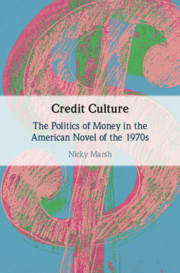Book contents
- Credit Culture
- Credit Culture
- Copyright page
- Dedication
- Contents
- Acknowledgements
- Introduction
- Chapter 1 No Place Like Home
- Chapter 2 Don DeLillo and American Credit
- Chapter 3 William Gaddis and Corporate Credit
- Chapter 4 When Women Counted
- Chapter 5 Toni Morrison and the Promise to Pay
- Chapter 6 Dorothy’s Endless Return
- Notes
- Index
Chapter 5 - Toni Morrison and the Promise to Pay
Published online by Cambridge University Press: 25 June 2020
- Credit Culture
- Credit Culture
- Copyright page
- Dedication
- Contents
- Acknowledgements
- Introduction
- Chapter 1 No Place Like Home
- Chapter 2 Don DeLillo and American Credit
- Chapter 3 William Gaddis and Corporate Credit
- Chapter 4 When Women Counted
- Chapter 5 Toni Morrison and the Promise to Pay
- Chapter 6 Dorothy’s Endless Return
- Notes
- Index
Summary
This chapter uses the work of Toni Morrison, especially Song of Solomon, to explore the racialised history of finance in America. The first section suggests that the two intertextual reference points for this novel, William Faulkner’s Go Down, Moses and Ralph Ellison’s Invisible Man, provide a telling history of those key moments in America – the 1870s, the 1930s and the 1960s – in which credit has been associated with false promise and dispossession for the African Americans. Its second section uses this context to trace the narrative of the protagonist of Song of Solomon, Milkman Dead, as he uncovers the loss that has constructed his own family history. Morrison traces this racialised history of finance, especially the self-ownership promised by insurance, to explore the particular and paradoxical crisis in the credit cultures of the 1970s. The novel reads the politics of the contemporary by returning to the old failures of both the New South and the New Deal and reckons with the persistent and still-present legacies of a credit system that was rooted in the trade in humans.
- Type
- Chapter
- Information
- Credit CultureThe Politics of Money in the American Novel of the 1970s, pp. 128 - 152Publisher: Cambridge University PressPrint publication year: 2020



